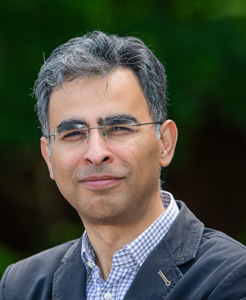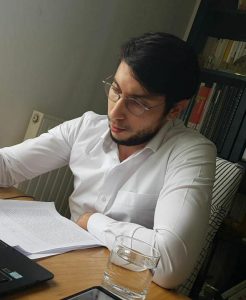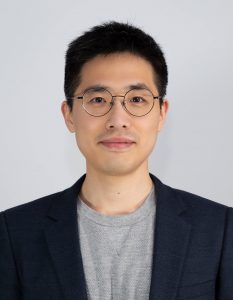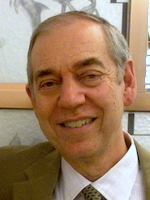

2025

Dr. Yael Kedar
Senior Lecturer, Multi Disciplinary Studies, Tel Hai College
Stay: February 2025 – May 2025
Project: The Status of Mathematical Entities: Roger Bacon vs Averroes
.
Averroes’ Long Commentary on Physics is considered the source of the medieval conception of mathematical theorems as imaginary and fictitious. Roger Bacon was a ‘realist’ who held to the extramental existence of mathematical objects and aimed to refute any real distinction between mathematical and physical quantities. He considered Averroes an important and direct foe. He discussed the question of “whether bodies touch at a point” to counter the argument, raised by Averroes, that mathematical continuity differs from physical continuity, and asked whether the heavenly bodies’ contrary motions can be conceived mathematically but not naturally. He answered that what is mathematically impossible is also naturally impossible, and vice versa.This argument was tightly linked with the debate concerning Ptolemy’s epicycles and eccentrics, in which both Averroes and Bacon were involved. Bacon objected to Averroes’ statement that opposite motions can be dealt with mathematically but not naturally. The result is a fascinating discussion concerning the purpose of astronomical theory: is it supposed to “save the phenomena” and account for the order of nature, and at what cost? My goal is to reconstruct Bacon’s debate with Averroes concerning the status of mathematical items and their function in physics and astronomy.
.
 Dr. Daniel Davies
Dr. Daniel Davies
Research Associate, Universität Hamburg
Stay: January 2025 – April 2025
Project: Isaac Abarbanel’s Cosmology
.
At the turn of the sixteenth century, Isaac Abarbanel wrote two major works about the doctrine of creation, New Heavens (Shamayyim Ḥadashim) and The Deeds of God (Mifʿalot Elohim). In these books, he reviews a few hundred years of Hebrew philosophy and critically discusses the major arguments advanced by a wide range of thinkers. He includes extensive discussions of cosmology because prior philosophers had claimed that the heavenlyconfigurations had important consequences for how to think about creation. Abarbanel focusses in detail on these issues in New Heavens. He addresses Aristotle, whom heapproaches chiefly through Averroes’ Middle Commentary on De Caelo but also through other writings by Averroes, and he also considers arguments by some Jewish Averroists, in particular Moses Narboni. I am currently engaged in an extensive study of New Heavens, which includes creating an edition and translation. During my stay in Cologne, I will work on the reception of Averroes’ arguments by Jewish Averroists and the ways in which Abarbanel deployed them. His engagement adds to the picture of Averroes that has been built up and will contribute to a general project about the reception of De Caelo among medieval Hebrew writers.
.

Prof. Dr. Adam Takahashi
Associate Professor, Kwansei Gakuin University, Nishinomiya (Japan)
Stay: February 2025 – March 2025
Project: A Study of the Reception of Averroes’ De substantia orbis in Late Medieval Cosmology
.
De substantia orbis is an original cosmological treatise by Averroes, the principal Commentator on Aristotle’s works. In this text, Averroes extends his analysis beyond the Aristotelian framework, examining the nature of celestial bodies, prime matter, and the relationship between heat and sunlight in the sublunary world. Frequently cited and analyzed by prominent scholars of the medieval and Renaissance periods, including Albertus Magnus, John of Jandun, Giles of Rome, Pietro Pomponazzi, and Agostino Nifo, the treatise became an important reference in intellectual discussions of the natural world and the universe.In this research project, I will investigate how Scholastic authors responded to Averroes’ ideas and assess the treatise’s impact on the development of late medieval cosmology and natural philosophy. Special attention will also be given to the manuscript tradition of the Latin text of De substantia orbis, examining how his ideas were transmitted and interpreted across different intellectual contexts.
.
 Dr. Hanna Gentili
Dr. Hanna Gentili
Research Associate, Universität Hamburg
Stay: April 2025 – June 2025
Project: Three forgotten texts about natural philosophy from Averroes’ circle and their Hebrew legacy
This project focuses on the collection of treatises on natural philosophy known as Averroes’ Questions in Physics. These treatises are almost entirely lost in the original Arabic, but survive in an anonymous Hebrew translation, accompanied by the commentary of the fourteenth-century Jewish Aristotelian philosopher Moses Narboni. This collection has a complex and stratified transmission history in Hebrew and Latin. It intertwines with Averroes’ De substantia orbis and reveals important aspects of the debates around natural philosophy that animated the circles of Averroes and his contemporaries. My project consists of the study, editing, and English translation of three unpublished treatises that were an integral part of the Questions in Physics as they migrated to the Hebrew world, despite not being authored by Averroes himself: abū Jaʿfar ibn Sabāq’s Treatise on Prime Matter and two treatises by abū al-Qāsim ibn Idrīs, the Treatise on Prime Matter and the Treatise on the First Forms.
.
2024
 Dr. Reza Pourjavady
Dr. Reza Pourjavady
Adjunct Professor (Privatdozent), Religious Studies, Goethe-Universität Frankfurt am Main
Stay: November 2024 – January 2025
Project: Studies on the Arabic and Persian Glosses of Averroes’ Short Commentary on Aristotle’s Physics
Photo Credit: Andrea Kane, Institute for Advanced Study
.
In the early 17th century, copies of Averroes’ works arrived in Isfahan, where they were met with great enthusiasm by Safavid philosophers who had previously been unfamiliar with his writings. One notable work was Averroes’ short commentary on Aristotle’s Physics, which soon attracted considerable attention among scholars. Although Safavid philosophers began engaging with the text and occasionally integrating its ideas throughout the 17th century, it was in the late 17th and early 18th centuries that the commentary gained prominence as a teaching text, as evidenced by the glosses found in the margins of some copies. This project seeks to examine these glosses, aiming to identify the glossators where possible and to explore their reflections on Averroes’ philosophical positions.
2023
 Dr. Abdelouahab Rgoud
Dr. Abdelouahab Rgoud
Postdoc, École normale supérieure de Lyon
Stay: August 2023
Project: French Translation of Averroes’ Kitāb al-kašf
.
I would like to use this grant to propose a bilingual Arabic-French edition, annotated, commented and introduced, of Averroes’ work : The Unveiling of the Methods of Demonstration of the Dogmas of the religion.
This work by Averroes is part of a three-part response by the Andalusian philosopher to the attacks of the theologians of his time. The three works, written around the year 1179, respectively serve distinct purposes : to lift the Ghazalian mortgage on the accusation of internal incoherence in the practice of philosophy for The Incoherence of Incoherence, and to highlight the religiously obligatory character of philosophical practice for those who are endowed with reason and trained in the subtleties of demonstrative discourse, with the Fasl al-Maqal, the Decisive Discourse.
Once this epistemological reversal is established, the Andalusian philosopher goes on the offensive, in a third and last stage, the one that will interest us in the framework of the present project, that of the Kashf, which consists in the highlighting of the collapse of the multiple theological approaches, in the sense that they go, each one for different reasons, not only reveal themselves to be in contradiction with the philosophical approach, but, even more, reveal themselves to be in contradiction with the religious discourse itself, which would make them all absurd ways, in the sense that they go against their first intended effect.
.
 Dr. Francesco Binotto
Dr. Francesco Binotto
Research Assistant, Pontifical Institute of Mediaeval Studies / University of Urbino
Stay: June–September 2023
Project: Averroes’ Account of the Contingency of a Cause and its Reception in the Early Fourteenth Century-Masters at the Faculty of Arts of Bologna (Thaddeus of Parma, Cambiolus of Bologna and Matthew of Gubbio)
In his Long Commentary on the Physics (II, c. 48), Averroes rejects the Avicennian extrinsic account for explaining the contingency of causes: contingency expresses the possibility of being impeded that characterizes the intrinsic nature of a cause, and it does not depend on the external impediments with which the cause collides. Some of the masters at the Faculty of Arts of Bologna, such as Thaddeus of Parma, Cambiolus of Bologna and Matthew of Gubbio, while discussing the issue of fatalism, propose different explanations of the contingency of causes and effects in nature. During my stay at the Thomas-Institute, my purpose is to examine the following research question: if and to what extent Averroes’s account influenced Thaddeus’s, Cambiolus’s, and Matthew’s explanations of the contingency of causes in nature. The novelty of my project consists in extending the scholarly research by focusing on the influence of Averroes’s Long Commentary on the Physics on the Faculty of Arts of Bologna. Specifically, I aim to reconstruct the arguments elaborated by Thaddeus, Cambiolus, and Matthew, for justifying the contingency of causes.
2022
 Dr. Kyuhee Park
Dr. Kyuhee Park
PhD Friedrich-Schiller-Universität Jena
Stay: November–December 2022
Project: The influence of Averroes on Thomas Aquinas’ Cosmology
.
My research aims to clarify the influence of Averroes on Thomas Aquinas’ cosmic theory. The theory of celestial soul and Intelligence is found, for Averroes, in De substantia orbis, and for Thomas, in the Commentary on the Book of Causes, and confirmed in their respective commentaries on Book Lambda of the Metaphysics. Although he considers the Book of Causes as a supplement to Aristotle’s Metaphysics, it seems somewhat insufficient for Thomas, since there the celestial soul and an Intelligence are just posited, but not proved. However, on account of his own metaphysical method (resolutio) he needs an argument for their existence. It is assumed that he must have accepted Averroes’ argument from De substantia orbis, if neither the Book of Causes nor Aristotle offers it. There is some evidence to support this suggestion: First, Thomas’ reinterpretation of Averroes’ view on the efficient causality of the celestial sphere; Second, his replacement of the premise of Averroes’ argument for the unmoved mover on account of the singularity of celestial soul; Third, this approach has a great similarity with the method used by Albert the Great in his Commentary on the Book of Causes (Dcpu), who cites there Averroes by name.
2017
 Prof. Dr. Steven Harvey
Prof. Dr. Steven Harvey
Professor of Jewish Thought, Bar-Ilan University, Israel
Personal Website
Stay: January–March 2017
Project: The manuscript tradition of Averroes’s Middle and Long Commentaries on the Physics.